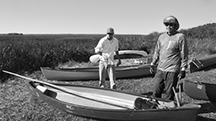
By Brett Larson, October 1, 2015
Rice Lake in District II is the Napa Valley of wild rice, and the rice itself is Grade A, Prime Cut, First Class. In other words, the good stuff.
District II residents, the Rice Lake Anishinaabe, are master ricers, pro’s pros, and connoisseurs.
Rice is in their blood. It has held the community together for generations.
But it didn’t come without a fight.
District II ricers are fighters, through and through. They’re talkers, teachers and historians, too. A day at the lake includes stories of treaties made and broken, of citations and confiscations and eventual victories.
They talk about the Sandy Lake Tragedy, when 400 Anishinaabe died in the winter because they’d been promised food that never came — food that was needed because they were torn from their homelands, where rice had been their staple.
They talk about the chiefs and leaders of the Sandy Lake and Rice Lake communities, from Hole-in-the-Day in the 1800s to Clifford Skinaway and George Aubid 100 years later.
They talk about 1889, when Henry Rice came by train to nearby Kimberly to deceive the Indians into giving up their land and moving to White Earth.
And they talk about battles with the State of Minnesota and the U.S. Fish and Wildlife Service.
After hundreds of years of harvesting the rice, the Rice Lake community was uprooted from the lakeshore in the 1930s, when President Franklin Roosevelt declared the lake a wildlife refuge. The ducks took precedence over the people.
Suddenly the Rice Lake Indians were in need of refuge. Some scattered to the homes of friends and family in Fond du Lac, White Earth or Wisconsin. A shopkeeper in East Lake let some families stay in an old building until they could earn enough to start buying their own land.
The memories are still fresh at the landing.
Mandy YoungBear, who married into the community, has learned the stories and knows the names. She talks about Sam Yankee, the former Mille Lacs Chief, who along with his wife Ada adopted some needy children.
She talks about Julie Shingobe, a District Representative from the area, and about Mushkooub, Mandy’s father-in-law, the long-time activist and leader who passed away last winter.
Mandy also talks about the nutritional value of the rice, as she cleans seed from the tops of rice plants that have been left behind at the landing.
Generations of Rice Lakers fought for their right to harvest the rice under their own rules, and today they’re mostly left alone to gather what they need as their ancestors did.
At the landing, Rice Lake once again feels like a refuge for people as well as ducks.
David ‘Niib’ Aubid, a lifelong warrior for his people’s rights, comes by the landing and stays to tell stories of battles he fought with his brother Mushkooub.
Niib knows how good it feels for Indians to come to Rice Lake, knowing it’s theirs, regardless of the official designation. He’s been called a “parasite” by refuge managers and been met with sawed-off shotguns for exercising his rights.
Niib’s son, Michaa Aubid, and his nephew, Darrell Shingobe, come by at the end of the day to see what’s happening. They’ve been in District I selling rice, so they weren’t on the water.
Michaa talks about the geology of the region, about glacial Lake Aitkin, and eons past when Rice Lake drained south, to the Snake River. He talks about the floods and the attempts to drain the lake for agriculture.
Some lakes have needed re-seeding over the years, Michaa says. Others have been flooded out by dams and drained for farmland. Rice Lake is pristine, with a native strain of rice that dates back at least 10,000 years, when the last
glaciers retreated.
Darrell points to his Uncle Niib, saying, “They’re the ones who made the sacrifices. We owe this all to them.”
At 3 p.m., the GoodSky brothers, Harvey and Algin, come in off the lake, Harvey poling while Algin knocks. Harvey’s fiancé, Morningstar, is there to meet them with their smiling son, Harvey the Third.
It’s another generation of fighters. The young brothers have testified against the Sandpiper and Line 3 pipelines, which would cross the watershed and threaten the water and rice.
The brothers are tired after six hours on the water, even though they switch places throughout the day.
Much of the rice has already been harvested, so it’s not a heavy haul.
Still, it was a good day, as it always is when you’re a Rice Laker, ricing on your refuge.